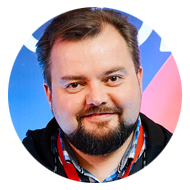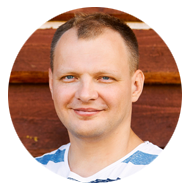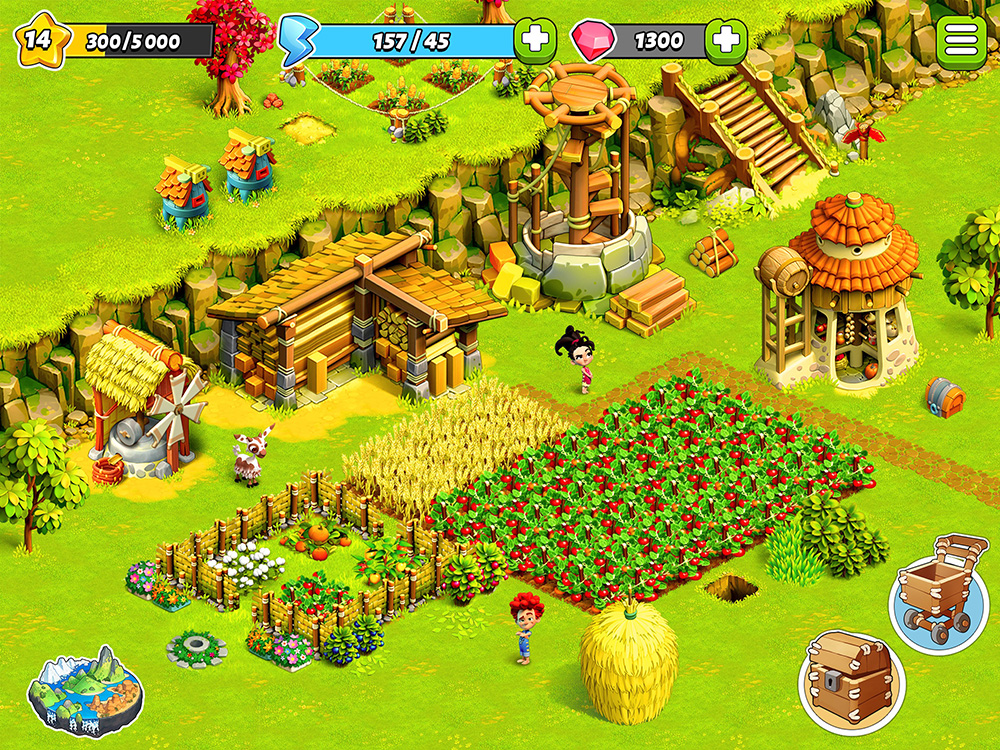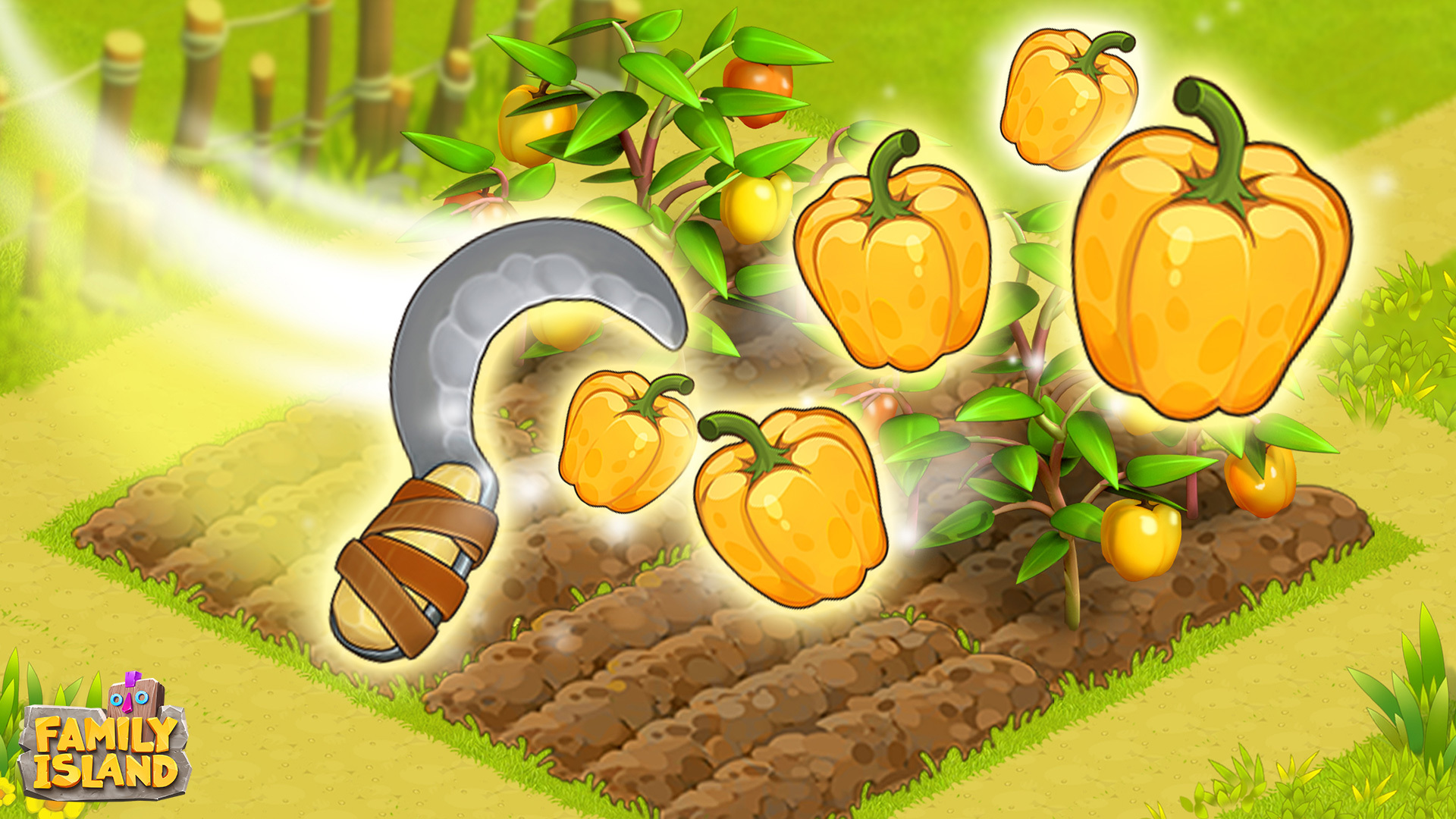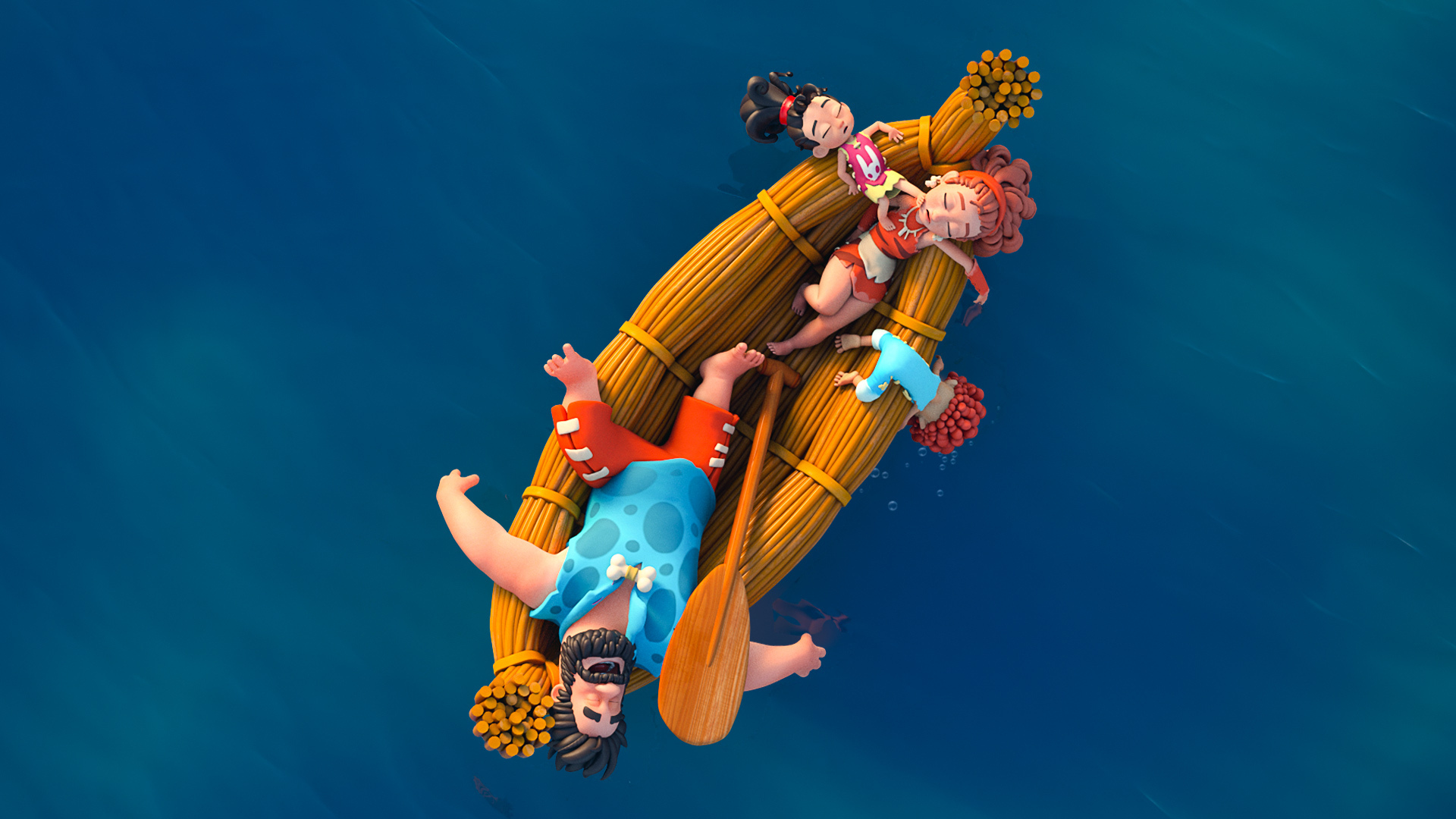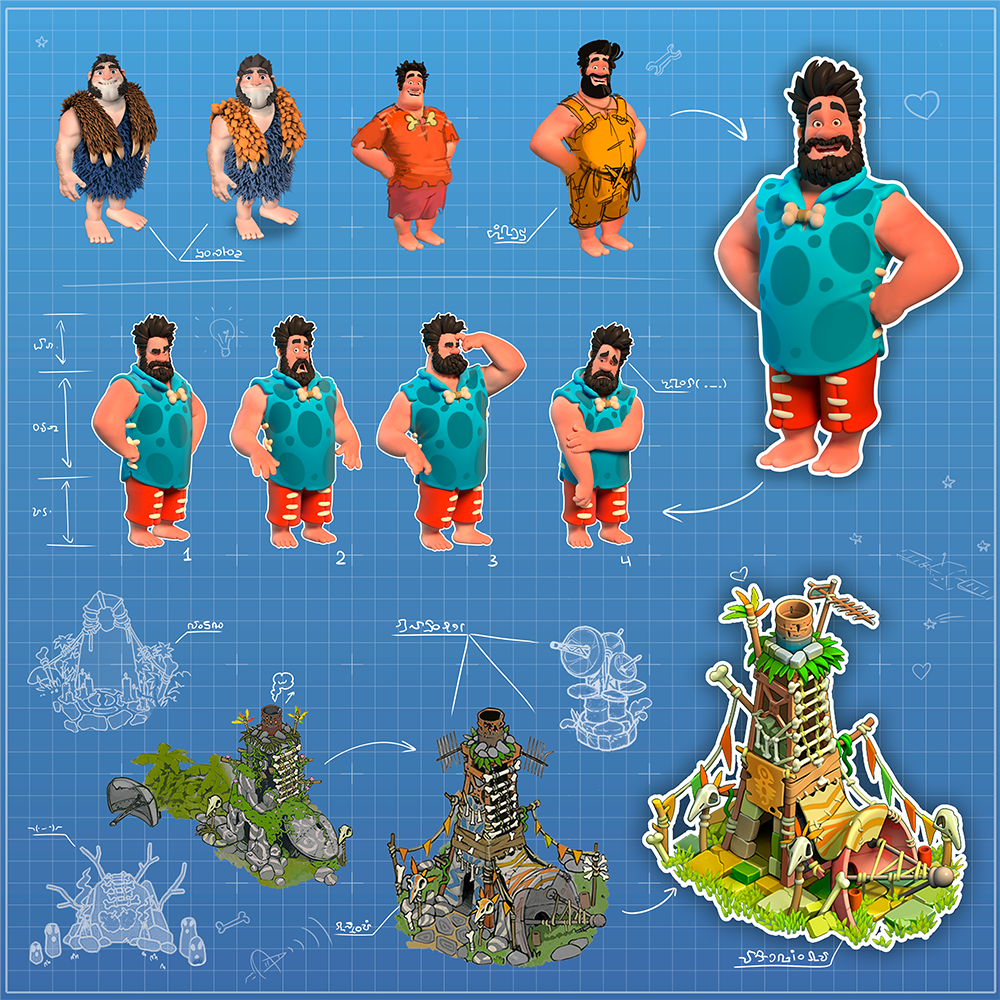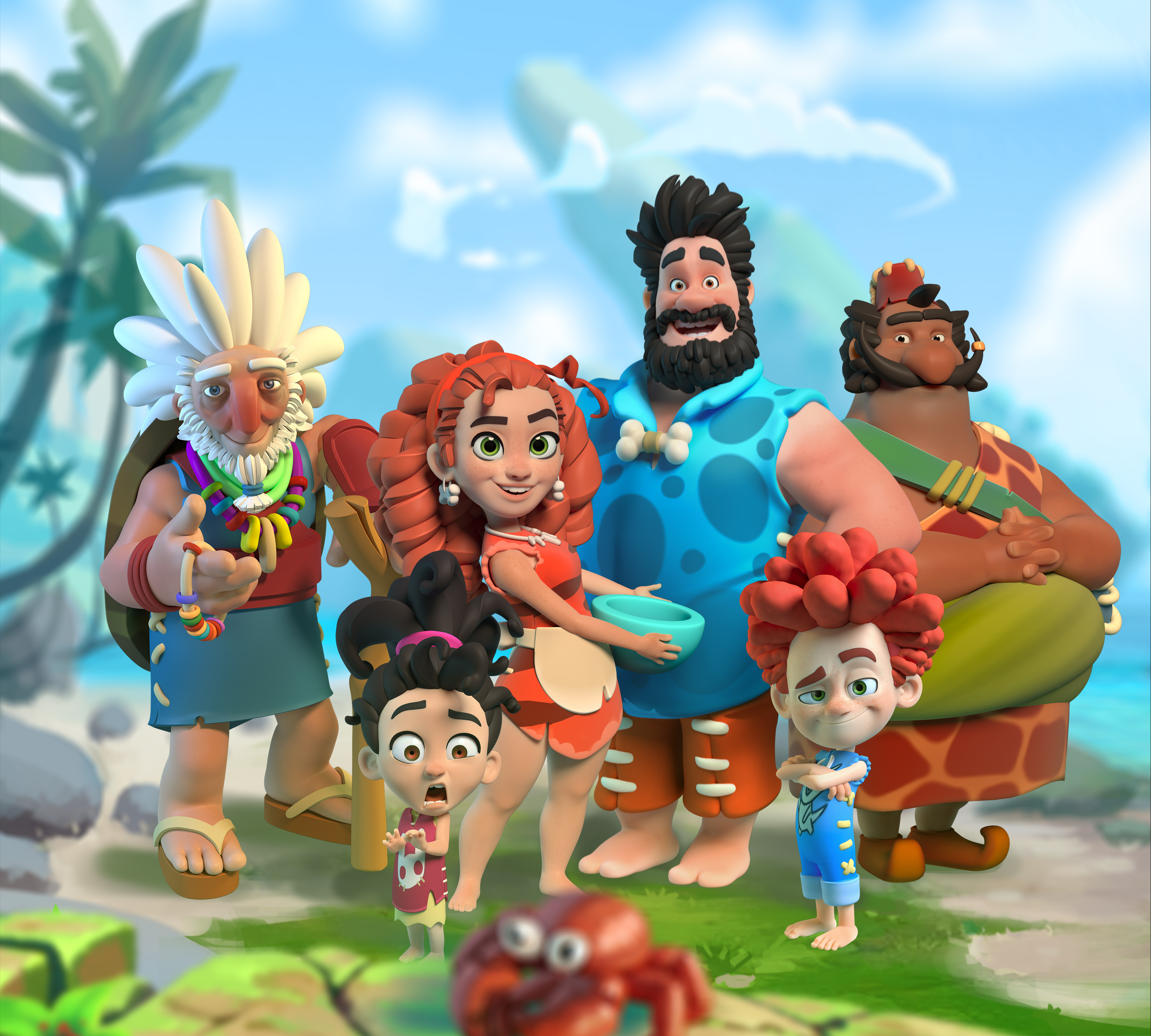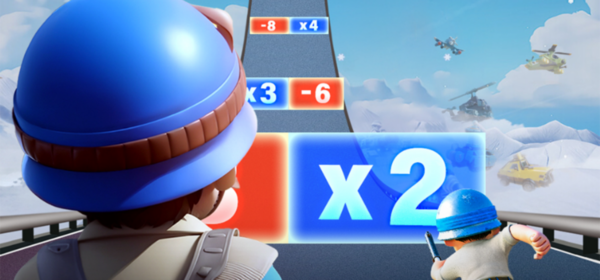"We got options," - the authors of Family Island about the merger with Melsoft
Family Island is the main opening of the Belarusian game show this year. Over the past 12 months, the monthly revenue of the farm about the prehistoric family has grown 100 times. If in September 2019 she earned $ 50 thousand, then in September 2020 — more than $ 5 million. The development team — Easy Team — was able to achieve such results after merging with Melsoft. About how it was, — App2Top.ru I talked to the authors of Family Island and the management of Melsoft.
App2Top.ru Questioner: Guys, at the beginning of the conversation, please tell us about yourself. Who are you and what do you do at Melsoft?
Alexander Shilyaev
Alexander: I am the Chief Operating Officer of Melsoft. I am responsible for the work of the company, its strategy and functioning. Since 2015, one of the co-founders of the current Melsoft together with Andrey Yarantsev.
Vitaly Moroz
Vitaly: I am the head of the Family Island project. I created it, and now I’m thinking about how to grow it. I see my role in “sitting high, looking far away,” as well as anticipating the development of the project situation and preparing solutions related to the team and game design in advance.
Before we start talking about business, tell us just a little bit about the project. What is it and what are its main features?
Vitaly: Family Island is a very beautiful and kind farm game where the player must help a primitive family to live and be happy. Gameplay is all based on clearing maps, re-crafting resources into something useful and improving the base. Each of the elements we use can be found in other games, but we have it all very well and interestingly done.
Oh, yes, there is no soft currency in the game. If anyone can justify why we need it, we will add. But if the characters often walk on the grass, then over time they trample paths on it.
Family Island
How interesting! Do you mean that there is only a hard currency that is purchased for real money?
Vitaly: Yes, there is only hard without earned coins. It’s just that coins are usually used to manage progress, and we already manage progress through exp and other mechanisms. So I refused coins as a separate entity, considering them a vestige and a tribute to traditions.
Original! Let’s talk about history now. When and how did the project start?
Vitaly: We started development in the fall of 2016, although I wrote the concept back in 2015. The wonderful artist Ali Ghorbani supplemented it with sketches, then I found a potential technical director and a potential art director, and then I went for investments.
We agreed on them with Stark Games. I wouldn’t have had enough of my savings for even a fifth, but with enthusiasm, I’m only good at dreaming in a bar with a beer. In general, thanks to them for giving me such a chance — there was no queue of those who wanted to finance the game.
But this is, of course, a very short and simplified version. At least a separate article could be written in full: and about how I found the future art director by simply liking a picture on Facebook, and about how the first technical director changed his mind about helping on the eve of the start, after which I urgently had to look for a new one, not even having the means to live until the end of the month becausefor this sudden postponement.
It was like in a fairy tale, where you need to cross the abyss on an invisible bridge, and you just step into the abyss, without any insurance or backup options.
The technical director eventually became Nikolai Armonik, known for the project “Legends of Eisenwald“, and by a strange irony of fate we were sitting right under the Vizor, sometimes seeping into their kitchen during parties.
It sounds crazy, but sometimes it was.
Why did you decide to make a farm at the initial stage? Dreamed of making your own FarmVille?
Vitaly: No, I never had a dream of becoming a “farmer”. I liked more masculine games about war, strategy and tactics. And my path to game dev began with mods for Rome: Total War, Mount & Blade and similar hardcore games. By the way, initially Family Island itself was supposed to be a survival game, where the characters froze, starved and got wet in the rain.
And how did the game turn into a farm?
Vitaly: I managed to make myself some kind of reputation in game development just while working on farms. I took part in the creation of Knights&Brides from Vizor and Funky Bay from Belka Games.
Accordingly, I could only get investments for a farm. Now, only the broken shower and toilet (which players constantly complain about), and the food cooking system remind of the original plans in the game.
Did I understand correctly that this was a condition from Stark Games?
Vitaly: No, it’s just that when talking about investments, a discussion of previous experience inevitably surfaced. Investors were not ready to give me money for anything other than a farm.
Family Island
Defold was chosen as the engine. A very non-standard solution. Why him?
Vitaly: Back then, in 2016, Defold looked like a very promising engine. Unity was not good at 2D, and the 3D prototype that we made on it with friends even before the search for investments was “scary as death”. Plus, King promised support with promotion, which looked very attractive with our modest budgets. It was suggested by our technical director. I had no objections.
In short, looking back, what pros and cons would you single out from him?
Vitaly: From the pros, I would note that the engine is very nimble. He very cheerfully digests a huge number of sprites, and the final build takes up little space. Plus, our programmers liked to communicate in the Defold party, and the happiness of programmers is also an important matter.
Of the minuses: there are few middleware (some intermediate solutions that would make life easier), we had to write all the tools ourselves. There are also few ready-made specialists familiar with the technology: it is more difficult to grow a team, when working with another engine it would be easier.
In general, most of the disadvantages do not relate to the technology, but to its low prevalence.
When you do the next project, will you also use Defold?
Vitaly: Never say “never”.
In my opinion, the choice of technology for the game is like the choice of film and equipment for the film: the operator understands this better than the director.
I really like the guys working on Defold, they put a lot of energy and passion into it. I hope that they will be able to find their solid niche so that their offspring lives and develops. It would be great if the success of Family Island would contribute to this a little.
Alexander: I will add that since 2020, the Defold engine has moved to open source and our company has entered into a partnership with the Defold team, receiving the status of Corporate Platinum Partner.
Let’s go back to the history of development. For the first three years, you made the game as an independent team. How big was it then (by the way, how many people are working on it now)?
Vitaly: We started with a core team of three people. After about a year, they grew to 15-17 people and remained within these limits until the merger with Melsoft.
Now we have about 40 people in our team and several dozen people who are not directly related to the project, but who do very important work for us: marketing, bizdev, translation, outsourcing, etc.
It seems that a little more and I won’t be able to remember everyone by name anymore.
Family Island
When and why did you realize that the game needed not only an investor, but also a separate partner/publisher?
Vitaly: We immediately had such a plan in mind: try it ourselves, and if we see that our own/attracted funds or expertise will not be enough, then we will try to attract a more experienced and strong partner.
Despite the fact that the development budget was quite modest (for example, the art director and I worked for a nominal salary), and many of the employees were my recent students (for them it was their first job), we still exceeded the originally agreed amount by almost half.
The game itself did not fly. Only once — in June 2018 — Google suddenly began to give a lot of traffic, a couple of thousand installations a day. We began to grow and even at the end of the month we reached an operational plus. But it ended as suddenly as it began. And we were in the “red zone” again.
The game had to be either sold or closed. It was very disappointing to close it, because we put all our soul and strength into it.
Plus, the game had excellent retention even then, although payments still had to be worked on.
So there was talk about finding a buyer.
How did Melsoft appear in your story? Why did you end up with him?
Vitaly: I’ve known the guys from Melsoft for a long time. Actually, I decided to go to game dev after I watched Sasha Shilyaev’s report on KRI-2009, and Andrey Yarantsev was the director of the first gaming office where I got a job — Nival Network.
We knew each other and I showed them another of the first prototypes, boasted that in a year and a half it would become a cool game.
In general, they kept their finger on the pulse of the project.
Therefore, when the question arose about finding a partner / buyer, they were among the first to whom I wrote. I wanted to find people, not just businessmen, but those who also love games, who would help the product open up so that people would play and rejoice.
Well, it’s clear with this, but what exactly interested the publisher in the game?
Alexander: It’s important to make a reservation here: Melsoft has never positioned itself as a publisher. And in the classical sense, we are not. We publish only those games that we make ourselves. And we believe that this is the only working model for a long time.
Returning to your question: when I saw Family Island, I thought that we could bring this project to release using our experience gained at My Cafe. The project had good graphics, a strong monthly retention and a universal setting.
Family Island
Can you share what business indicators the game had before Melsoft started helping the project?
Alexander: In the CE, what we had was data from Facebook Analytics. The game was actually a client, you could trust only one source.
As we have already noted, the medium-term retention was strong, but it was clear that the first session and payments required improvements.
At that time, I was captivated by the complete openness of the team and Vitalik, who told me absolutely honestly what the project consists of, how it is done, and even that they actually do not have analytical tools (it was about the fact that the project was configured almost “by touch”).
Initially, it was only about the publication, or did they immediately start talking about integration?
Alexander: Initially it was about the publication, because that was the request from the owners and the team. But when we started studying the product internally, we realized that we would need to invest several times more in it than we had already invested, and we would also have to integrate our own server and analytics developments. Such investments should already be controlled.
I see a big difference between making a “game-app” and launching a “game-product” for millions of consumers.
To ensure this, we need close integration of development with marketing, monetization department, community management, technical support. It is almost impossible to do this within several companies on a contractual basis according to the publishing model. This does not work in mobile products.
But integration into another company for the development team is a difficult decision. Do you think if Easy Team just took a big loan from the bank, the game would have been able to perform like it is now?
Vitaly: Hypothetically, if I could raise N million dollars?
I think I would be able to rock the game up to $0.5-2 million a month. But no more. Plus, it is unknown how long it would take.
The publication of the game and further support is a rather specific set of knowledge. It is possible to grow such expertise from scratch, but it would be long and expensive. Without the help of Melsoft, I would definitely not have been able to achieve the current indicators, for this I simply would not have had enough experience, mindset, expertise.
Alexander: Money by itself does not solve the issue of expertise. It takes at least time for the expertise to accumulate and strengthen. It took Melsoft several years to learn how to effectively publish My Cafe, although we had a lot of Wargaming and “access to world class expertise” behind us.
It is clear that the details of the transaction are under NDA, but I can’t help but ask: was the sale purely a financial story or did the owners of Easy Team also receive shares in Melsoft?
Vitaly: Shares in Melsoft were not discussed at that time. We have received options and an agreement for a certain amount if the agreed conditions are met.
There is another important nuance. The numerous structure includes a small studio, whose first project quickly begins to generate profit. What was done and how was it done so that the employees of Easy Team would not be disappointed in the takeover?
Alexander: It was almost perfect team integration.
In February, the team came to our office, we provided the guys with modern equipment, made a revision of salaries to bring them in line with the internal forks.
An internal product and team development summit was held before the end of the month. We have formed plans for hiring and rebuilding the team and plans for finalizing the project and putting it into release. Some departments and functions of Melsoft were almost completely switched to integrating the new team and project into the company. This was extremely important for the company: we were moving from a single product in operation to a multi-product structure.
Vitaly: There was a very good attitude towards us from the start, our experience was recognized and appreciated. Where we lacked expertise (QA, marketing, server, project management), we were strengthened with Melsoft resources. At the same time, where we could offer something, for example, in terms of game design expertise, we already shared our experience with the rest of the company.
We go back a little bit. So, the studio joined Melsoft. What difficulties have you encountered?
Alexander: It was obvious that the team was understaffed: there were no analysts, server programmers, a strong RM, there was a lack of game designers.
The amount of content that was needed for the release had to be done by a much larger team.
For the first six months, we hired and rebuilt the team. Also, as I noted above, Melsoft was also being rebuilt, moving to a multi-project structure.
Family Island
And what and how was it necessary to change in the project itself?
Vitaly: It was necessary to greatly increase the amount of content: if we used to do an update for several months, now we needed updates to come out every few weeks and at the same time not conflict with each other.
A new quantity demanded a new quality. This is called “manufacturability” in engineering science.
Please tell me what you mean.
Vitaly: Look, when you develop a game with small forces, you optimize production for a quick and cheap result. In our case, after merging with Melsoft, the budget ceases to matter, but it became necessary that everything was very reliable, scalable, flexible. We had to do a huge refactoring of both code and workflows.
One of the main problems of the project is the high connectivity of components. For example, you change something in the mechanics of cooking, and because of this, the passage of the third island moves out. For this reason, it is necessary to rebuild the game so that different components can be changed independently of the others.
There is also, of course, a huge layer of ideas on how to change the game mechanics and features themselves. Now we are thinking of allocating a separate unit for this work within the framework of the project.
This is very cool. Imagine: it seemed that everything had already been thought out, honed over the years… And then you wake up in the morning and realize that everything can still be improved by an order of magnitude!
From the outside, of course, the main change seems to be a new visual style. What and why did they decide to change it?
Vitaly: The facelift was made entirely by the team, the artists began working on updated characters and visual even before the deal with Melsoft, but this work ended much later.
The reason is simple. A critical mass of expertise has accumulated, a quantity that has passed into a new quality. Interestingly, almost all the art in the game went through three or four iterations, and this is already, it turns out, the fifth.
Alexander: On the marketing side, it was important to update the name/logo and key marketing assets. Updating the characters and the new logo raised the bar for the quality of the product — our task was to look like a modern cartoon.
Family Island
How much time did it take to change the processes in the team and to change the project?
Alexander: At least six months. It should be noted that changes in the project and in the team are still ongoing. It is important for us to build processes in the product so that it not only can be released regularly and without delay, but also so that we can do more things in parallel.
How much of the current success was expected?
Vitaly: You can’t start a project and assemble a team without faith. Yes, we believed that the game would be successful, somewhere deep down we hoped that it would be a great success, but the final result exceeded even the wildest expectations.
Alexander: I agree that faith in the project is one of the prerequisites for its start and development. Plus, we potentially saw demand in the niche of farms itself: no one has contributed anything to this genre for a long time, and we have a good opportunity to do it.
The story of Easy Team has become an amazing case for Melsoft. I don’t remember such in the CIS market anymore: to take a third-party team and bring out its project for $ 5 million a month (and the figure is growing). The question is: did Melsoft have such M&A ambitions before?
Alexander: Melsoft, like many other gaming companies, constantly studies the market, maintains friendly relations with other companies and teams, and exchanges information and experience.
We have been doing M&A before, but with varying success. With the arrival of Easy Team, it turned out to be finally determined that such a format of work and a business model (when we take a product at the initial stage and jointly bring it to commercial success) makes sense.
Now we clearly understand what needs to be done when a small company comes with an interesting product, how to invest in it and develop it, how to move from the stages of formation and growth to permanent management.
Where does such a desire come from? You could continue to grow projects inside, without acquiring.
Alexander: Inside a stable company, more technological projects work well, something that startups don’t have the time and resources for. The advantage of startups is in the originality of ideas. In our case, we take the best from both approaches.
How do you want to position yourself today with respect to third-party teams?
Alexander: As a company where you can unlock the potential of the team and product faster and stronger, as well as get the opportunity to achieve more than if the team did everything on its own.
What and on what terms are you ready to offer to teams that want to work with you?
Alexander: First comes the purchase of intellectual property. This is the basic condition for further cooperation. In other words, we are ready to fully invest only in the product whose intellectual property we will own. The team is allocated an option from future earnings and an annual profit-sharing according to the criteria accepted in our company.
What do you expect from third-party teams, what requirements do you have for them?
Alexander: It is important to us that the key backbone of the team (the leaders of this project, the people who started and live this project) is preserved. For them, cooperation with Melsoft should be the beginning of a new stage of life associated with the disclosure of the potential of the product and the team, but not the completion of the work. This is a fundamental moment for us.
Our new colleagues will continue to work on their product. At the same time, they should be ready for integration and teamwork in order to use the best practices and expertise that the company already has. The overall level of optimism and faith in the project is important.
Family Island
How do you see the process of selecting teams and projects inside Melsoft?
Alexander: We are interested in projects in established genres for a female audience. We focus our marketing expertise on it. We are not interested in, say, shooters, battlers yet. We focus more on the audience, not on the types of products, so in the future we may be interested in match-3, simulators, merge projects, etc.
Another important thing: we are not aimed at making complete clones of successful products. We work in established niches, but at the same time the product we are engaged in must be original. We focus on bringing him to the top positions in his genre.
My Cafe is now the top 2 game in the cooking genre. The goal is to make the game number one. Family Island was an unknown startup, now the top 4 in farms. The immediate goal is to get at least into the top 3 and compete for the top 1.
How is the work between the studio and the head office built after the takeover/integration?
Alexander: The work is built through tight communication (even if the team is sitting separately). We have a vision that the team that develops the product and deals with its operation and marketing is unified.
2020 forced us to become a distributed company. Now it is less important to us whether people are in the same office or not, but even if the team is at a distance, then ideologically we will perceive the team as a single one dealing with all cycles of product operation.
How independent are the development studios in their design decisions?
Alexander: The team must be ready for certain joint decisions. There is a part of the expertise that is both marketing, monetization, and analytical. All aspects can also influence design decisions. Our main desire is for the teams to be as independent as possible. Nevertheless, it is important for us that everyone understands that many things need to be brought up for broad discussion.
What to expect from Melsoft in the near future in strategic terms?
Alexander: Melsoft’s strategy is to develop and publish mobile games. We strive to ensure that each of our games enters the top of its genre. We are also actively working on a new project, which we hope will become the founder of a new genre.
The history of Family Island shows that we are able to integrate teams and projects inside Melsoft, achieve significant success with them. So if you have a game, show it to us. Maybe we can work together and do something very worthwhile!
I see. Thanks for the interview!
Is there any news? Share it with us, write to press@app2top.ru
